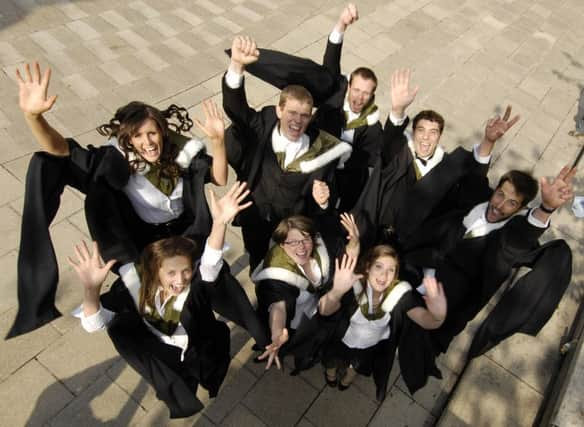Scotland’s most popular degree subjects


Figures released by UCAS (the Universities and Colleges Admissions Service), which processes all UK higher education applications, revealed there were 25,420 applications from would-be students living in Scotland in 2014 to study medical degrees such as nursing, physiotherapy, pharmacology and occupational therapy.
Business and administration studies was the next most popular subject grouping, receiving 21,100 applications, followed by biological sciences at 17,480 and engineering at 14,200.
Advertisement
Hide AdAdvertisement
Hide AdThe total number of applications made by Scots for leading degree subjects has risen since 2010, while the number of Scottish-domiciled applicants securing a higher education place at a Scottish university has also increased by 3 per cent in 2015 compared with the same time last year.


“Demand for a Scottish higher education remains consistently high from students across the whole of the UK and abroad,” said a spokesman for Universities Scotland, which represents the sector.
“Scotland’s autonomous higher education sector is delivering record levels of world-leading, high-impact research and producing highly skilled graduates with the best employment prospects in the UK.”
Competition is particularly intense for those hoping to study medicine, with the University of Glasgow receiving an average of 6.9 applications for every place available.
There were 5380 applications to study medicine or dentistry by Scots at a UK university in 2014.
Rachel Sandison, director of recruitment, said: “As a result of our world-class rankings and reputation for teaching and research excellence, we find students applying to the University of Glasgow to study some of our longest running professional subject areas such as medicine, education and engineering.
“In the 2015 QS World Subject Rankings, psychology, computing science and our medical school rank in the top 100 in the world, with veterinary medicine at Glasgow ranked in the top ten. These results, coupled our graduate destination statistics, which rank as some of the very best in the UK, has meant Glasgow has become a study destination of choice for students from across the globe.”
There are 923 medic undergraduates at St Andrews, the nation’s oldest university. The next most popular course among undergrads at the Fife institution is international relations, with 720 students, followed by history, with 620.
Advertisement
Hide AdAdvertisement
Hide AdThere is a rising demand across the UK for places on nursing courses, from a total of 103,550 applications in 2008 to 237,990 in 2014.
This increase in nursing reflects a rise in the commissioning of nurses for the NHS through workforce planning. Science and general engineering degrees have also seen sharp rises in demand over the past decade, while applications to study modern languages such as French or German have fallen by around a quarter.
“The changes in student numbers by broad subject areas demonstrate one important way in which the student population is altering over time, and illustrate that universities are responding flexibly to student choice and economic demands,” a Universities Scotland spokesman added.
Higher Education Statistics Agency records show there are currently 162,030 undergraduates enrolled in Scotland’s higher education institutions, including 116,555 Scottish-domiciled students, 19,940 from the rest of UK, 13,080 students from other European Union countries and 12,455 international students from non-EU countries.
There are 52,755 postgraduates studying in Scotland, including 22,490 Scots, 8,850 from the rest of the UK, 5,570 from other EU countries and 15,845 international students from non-EU countries. .
“Scotland’s diverse institutions are able to offer a huge breadth of educational opportunities, including over 4,500 courses, and the distinctiveness of each institution means each brings a unique portfolio of research and teaching to a particular subject,” a Universities Scotland spokesman added. “Such choice appeals to students around the world and as a high proportion of graduates tend to make their career and home in the place they studied this is in Scotland’s interests in terms of our ability as a nation to retain highly skilled talent.”